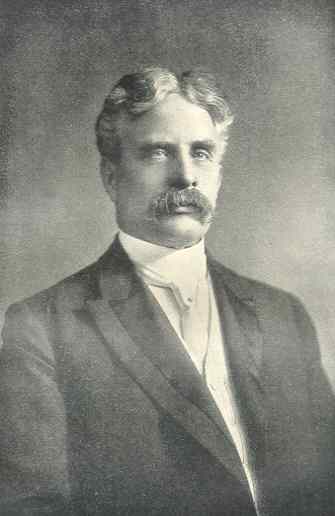|
Date Published:
January 2005 |
L’Encyclopédie de l’histoire du Québec / The Quebec History Encyclopedia
Sir
Robert Laird Borden
 Borden,
Sir Robert Laird (1854-1937) prime minister of Canada (1911-20), was
born at Grand Pré, Nova Scotia, on June 26, 1854, the son of
Andrew Borden. He was educated at Acadia Villa Academy, Horton, Nova
Scotia, studied law, and was called to the bar in Nova Scotia in 1878
(Q.C., 1891). He practised law in Halifax, and from 1893 to 1904 was
president of the Barristers' Society of Nova Scotia. From 1896 to 1904.
he represented Halifax in the Canadian House of Commons; and in 1901
he was chosen leader of the Conservative opposition in parliament, in
succession to Sir Charles Tupper, Bart. He was defeated in Halifax in
1904, but was elected for Carleton in 1905; he represented Halifax again
from 1908 to 1917 ; and from 1917 to 1921 he sat for King's county.
In 1911 he became prime minister of Canada ; and he remained at the
head of affairs in Canada throughout the whole period of the Great War.
In 1917 he formed a Unionist government of Conservatives and Liberals
on a platform of compulsory military service. He represented Canada
at the meetings of the Imperial War Cabinet and the Imperial War Conference
in 1917 and 1918; and he was the chief plenipotentiary delegate of Canada
at the Peace Conference in Paris, in 1919. Through ill-health, he was
compelled to resign as prime minister in July, 1920; and he then retired
from active politics. In 1921-2 he was the Canadian delegate at the
Washington Conference; and in 1922 he represented Great Britain in an
arbitration between Great Britain and Peru, in Paris . From 1918 to
1920 he was chancellor of McGill University, and from 1924 to 1930 of
Queen's University, Kingston. After his retirement from politics, he
published two volumes of lectures, Canadian constitutional studies
(Toronto, 1922) and Canada in the Commonwealth (Oxford,
1929) ; and in 1928 he was elected a fellow of the Royal Society of
Canada. He was created a member of the King's Privy Council in 1912,
and a G.C.M.G. in 1914. He is a D.C.L. of Queen's University (1903),
and an LL.D. of St. Francis Xavier University (1905), McGill University
(1913), McMaster University (1916), Edinburgh University (1917), Cambridge
University (1917), and Dalhousie University (1918). He died in Ottawa,
June 10, 1937, Borden,
Sir Robert Laird (1854-1937) prime minister of Canada (1911-20), was
born at Grand Pré, Nova Scotia, on June 26, 1854, the son of
Andrew Borden. He was educated at Acadia Villa Academy, Horton, Nova
Scotia, studied law, and was called to the bar in Nova Scotia in 1878
(Q.C., 1891). He practised law in Halifax, and from 1893 to 1904 was
president of the Barristers' Society of Nova Scotia. From 1896 to 1904.
he represented Halifax in the Canadian House of Commons; and in 1901
he was chosen leader of the Conservative opposition in parliament, in
succession to Sir Charles Tupper, Bart. He was defeated in Halifax in
1904, but was elected for Carleton in 1905; he represented Halifax again
from 1908 to 1917 ; and from 1917 to 1921 he sat for King's county.
In 1911 he became prime minister of Canada ; and he remained at the
head of affairs in Canada throughout the whole period of the Great War.
In 1917 he formed a Unionist government of Conservatives and Liberals
on a platform of compulsory military service. He represented Canada
at the meetings of the Imperial War Cabinet and the Imperial War Conference
in 1917 and 1918; and he was the chief plenipotentiary delegate of Canada
at the Peace Conference in Paris, in 1919. Through ill-health, he was
compelled to resign as prime minister in July, 1920; and he then retired
from active politics. In 1921-2 he was the Canadian delegate at the
Washington Conference; and in 1922 he represented Great Britain in an
arbitration between Great Britain and Peru, in Paris . From 1918 to
1920 he was chancellor of McGill University, and from 1924 to 1930 of
Queen's University, Kingston. After his retirement from politics, he
published two volumes of lectures, Canadian constitutional studies
(Toronto, 1922) and Canada in the Commonwealth (Oxford,
1929) ; and in 1928 he was elected a fellow of the Royal Society of
Canada. He was created a member of the King's Privy Council in 1912,
and a G.C.M.G. in 1914. He is a D.C.L. of Queen's University (1903),
and an LL.D. of St. Francis Xavier University (1905), McGill University
(1913), McMaster University (1916), Edinburgh University (1917), Cambridge
University (1917), and Dalhousie University (1918). He died in Ottawa,
June 10, 1937,
Source
: W. Stewart WALLACE, ed., The
Encyclopedia of Canada, Vol. IV, Toronto, University Associates
of Canada, 1948, 400p., pp. 257-258.
|

